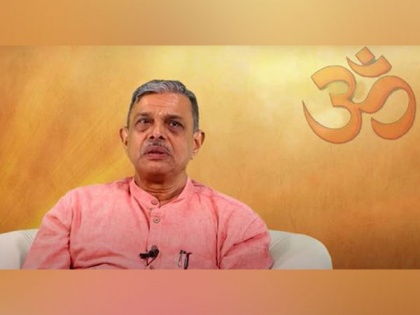People suffered "atrocities and barbarism" during Emergency: RSS general secretary Dattatreya Hosabale
By ANI | Published: June 26, 2023 05:03 AM2023-06-26T05:03:03+5:302023-06-26T05:05:02+5:30
New Delhi [India], June 26 : Recalling the "atrocities and barbarism" people suffered during the Emergency imposed by the ...

People suffered "atrocities and barbarism" during Emergency: RSS general secretary Dattatreya Hosabale
New Delhi [India], June 26 : Recalling the "atrocities and barbarism" people suffered during the Emergency imposed by the Indira Gandhi government 48 years ago, RSS general secretary Dattatreya Hosabale on Sunday broke down in tears and said it was a "black chapter" in India's history.
Hosabale was speaking at the Indraprastha Vishwa Samvada Kendra (IVSK), the RSS media wing, on the anniversary of the Emergency, imposed on June 25, 1975.
The Rashtriya Swayamsevak Sangh (RSS) leader recalled many "atrocities" inflicted on the people done during the 21-month-long Emergency. He said he was in Bengaluru at that time.
"We recieved the news (about Emergency) through BBC and Akashvani. Leaders like Atal Bihari Vajpayee, Advani Ji, Madhu Dandavate, and SN Mishra were also there because of their work regarding a Parliamentary Committe. We reached out to them and told them about the Emergency. Later, police arrested them and charged them under the Maintenance of Internal Security Act (MISA)," he said.
Stating that he himself was underground for six months, the RSS leader said,"Today's generation won't understand the situation that prevailed at that time easily because there was no TV, email, or mobile."
"Many a time I feel, should we remember that cruelty? Sangh's third Sarsanghchalak, Balasaheb Deoras had made an important statement after the Emergency. In his public address, he said, Forgive and Forget. But the acute atrocity that occurred during the black chapter of the country's history, is recorded in pages of history. There was widespread barbarism," he said.
Remembering the police atrocities and "inhumane torture", done on people inside police lockups, he said, "Some of these people became handicapped for life, some lost their eyesight."
"My friends, who underwent this torture, never distanced themselves from the ongoing movement," he added.
"A man, Raju, from Karnataka died inside a police station. This happened across the country," Hosabale said.
Recalling another incident he said, a pregnant woman, sitting on Satyagraha, was taken up by the police. She went into labour and was rushed to the hospital. But during her delivery time she was chained," he said breaking down in tears.
"It is not so that the pregnant woman will run away, and if the delivery happens then why was she chained?" he questioned.
Recounting the forceful sterilisation during the time, he said that the inhumane steps taken to control the population were a violation of human rights and will be listed as a "black spot" in the pages of history.
The Emergency came into effect on June 25, 1975, and was withdrawn on March 21, 1977.
The Emergency vested upon the Prime Minister the authority to rule by decree, allowing elections to be suspended and civil liberties to be curbed. The Emergency in 1975 is considered one of the most controversial periods of independent India's history.
Disclaimer: This post has been auto-published from an agency feed without any modifications to the text and has not been reviewed by an editor
Open in app